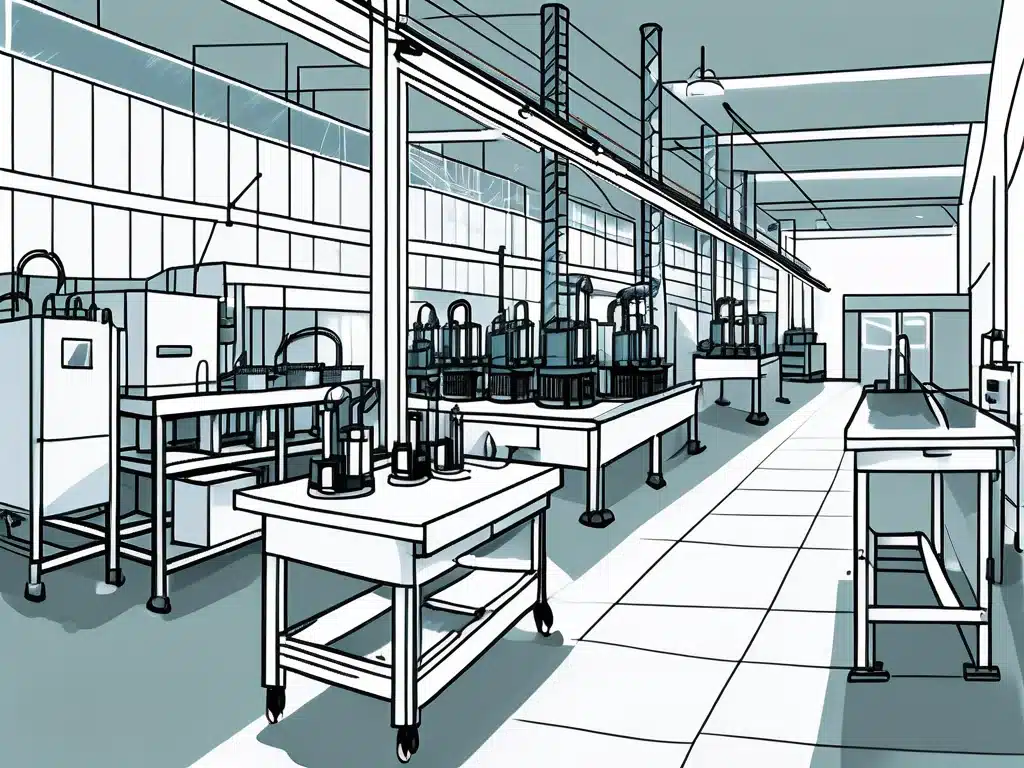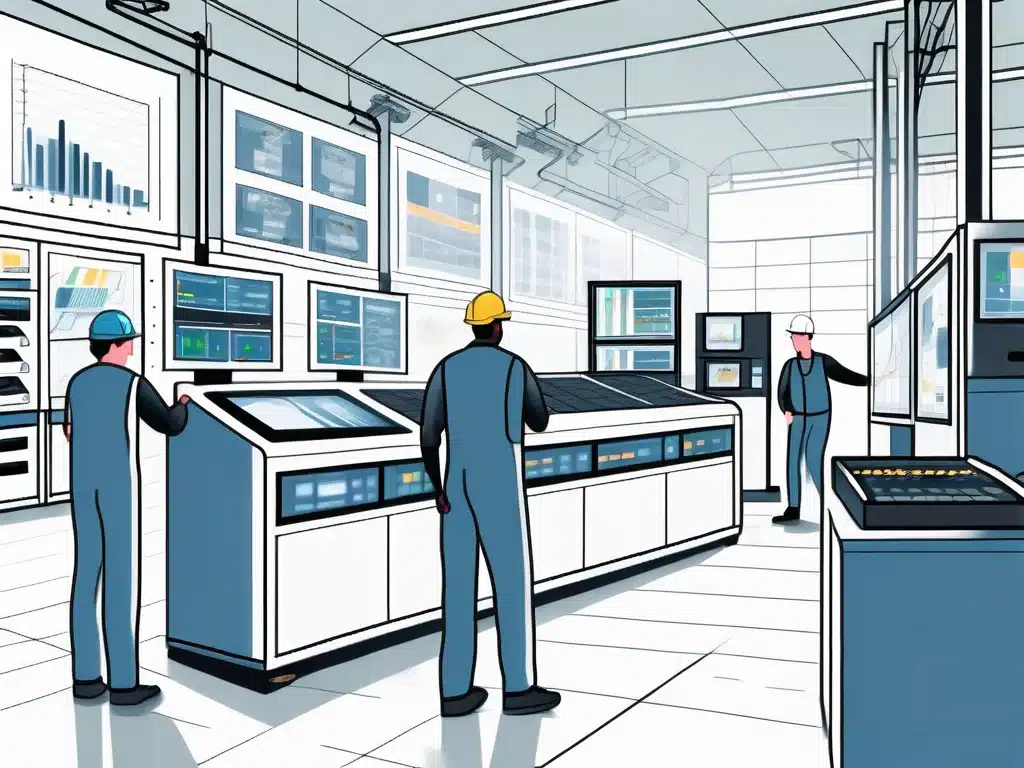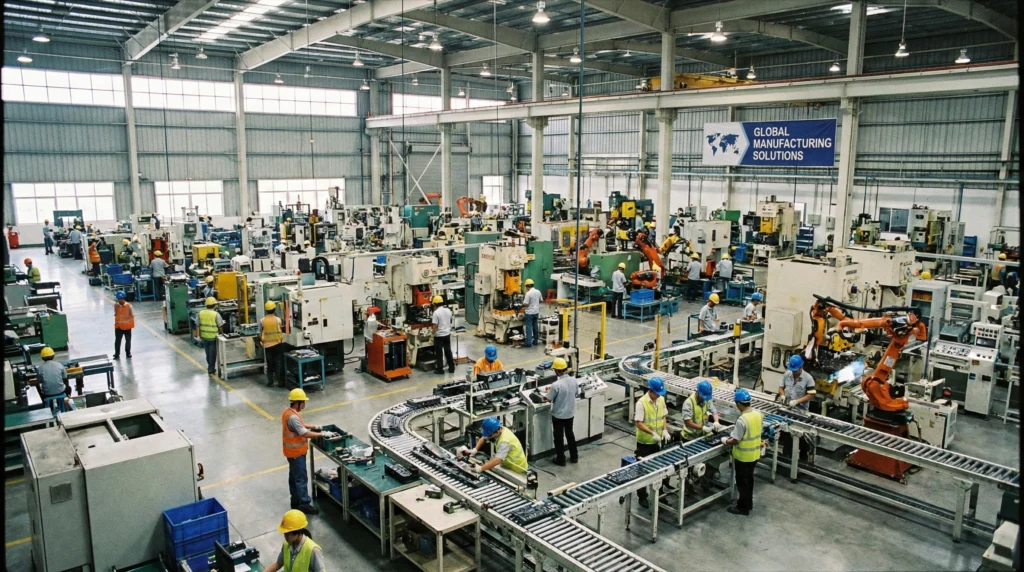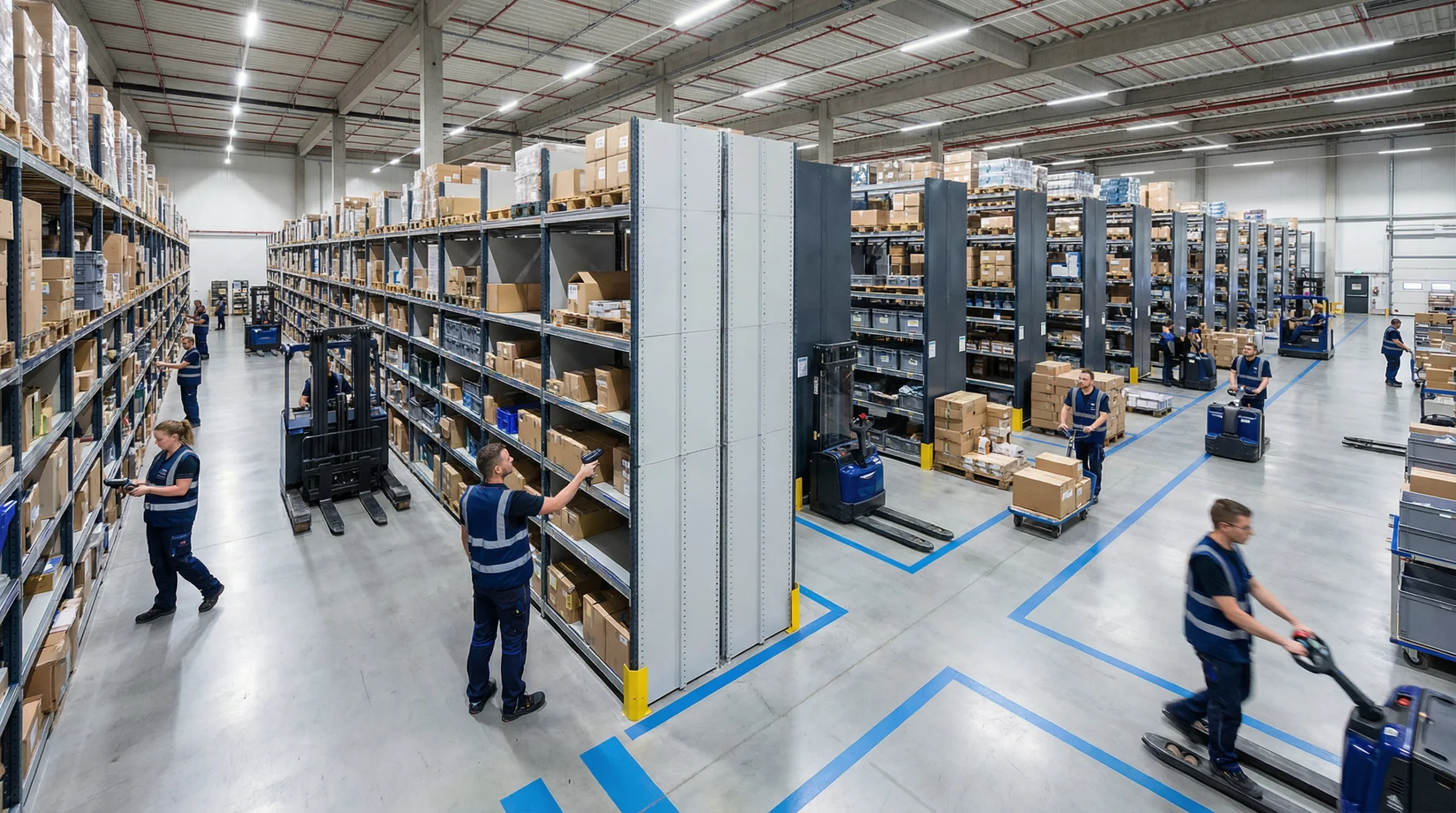In today’s rapidly evolving manufacturing landscape, shop floor control has emerged as a crucial element in ensuring the smooth and efficient functioning of production processes. By effectively managing and controlling the activities on the shop floor, manufacturers can optimize production efficiency, improve product quality, and ultimately enhance customer satisfaction. This article explores the various aspects of shop floor control, its role in manufacturing, real-world applications, and the benefits it brings to businesses.
Understanding Shop Floor Control
Definition and Importance of Shop Floor Control
Shop floor control refers to the set of practices and systems implemented to monitor, manage, and control the activities taking place on the shop floor. It involves coordinating resources, such as personnel, equipment, and materials, to ensure smooth production operations. The ultimate goal of shop floor control is to optimize productivity, minimize downtime, and deliver products on time, thereby meeting customer demands.
The importance of effective shop floor control cannot be overstated. With increasing competition and the need for quick turnaround times, manufacturers must have tight control over their shop floor operations. It enables them to respond swiftly to changing market demands, efficiently allocate resources, and identify bottlenecks or issues that hinder productivity.
Let’s dive deeper into the world of shop floor control and explore its key components.
Key Components of Shop Floor Control
Shop floor control encompasses various components that work together to streamline production processes. These include:
- Production scheduling and planning: This involves creating schedules, allocating resources, and setting production targets. A well-designed production schedule ensures that the right resources are available at the right time, minimizing downtime and maximizing efficiency.
- Real-time monitoring and data collection: Manufacturers use sensors, Internet of Things (IoT) devices, and data analytics to collect real-time data on machine performance, inventory levels, and production progress. This data provides valuable insights into the overall health of the shop floor, enabling proactive decision-making and timely interventions to prevent issues.
- Quality control: Shop floor control integrates quality control measures to ensure that products meet the required standards and specifications. This includes implementing quality checks at various stages of the production process, conducting inspections, and continuously improving quality assurance processes.
- Workforce management: It involves managing and tracking the activities of shop floor personnel, including assigning tasks, monitoring performance, and ensuring adequate staffing levels. Effective workforce management ensures that the right skills are deployed to the right tasks, optimizing productivity and minimizing errors.
Additionally, shop floor control also encompasses other important aspects such as maintenance management, inventory control, and equipment utilization. Maintenance management involves scheduling preventive maintenance activities to minimize breakdowns and maximize equipment uptime. Inventory control ensures that the right amount of raw materials and finished goods are available, reducing the risk of stockouts or excess inventory. Equipment utilization focuses on optimizing the use of machinery and equipment, minimizing idle time and maximizing output.
By implementing a robust shop floor control system, manufacturers can achieve operational excellence, enhance customer satisfaction, and gain a competitive edge in today’s dynamic marketplace.
The Role of Shop Floor Control in Manufacturing
Enhancing Production Efficiency
One of the primary objectives of shop floor control is to enhance production efficiency. By effectively managing resources, minimizing downtime, and optimizing production schedules, manufacturers can reduce waste, maximize throughput, and ultimately increase their overall productivity. Real-time monitoring and data collection enable manufacturers to identify areas of improvement, such as machine maintenance, process optimization, or workflow adjustments, leading to enhanced efficiency.

Efficient shop floor control also involves the utilization of advanced technologies such as Internet of Things (IoT) devices, artificial intelligence (AI), and machine learning algorithms. These technologies can automate routine tasks, predict maintenance needs, and provide valuable insights for decision-making. By leveraging these tools, manufacturers can streamline operations, improve workflow efficiency, and adapt quickly to changing production demands.
Improving Product Quality
Shop floor control plays a vital role in ensuring product quality and adherence to quality standards. By implementing robust quality control measures, manufacturers can identify deviations, defects, or inconsistencies early in the production process. Real-time monitoring and data analytics provide insights into product quality at various stages, enabling timely interventions and corrective measures. This leads to improved product quality, reduced rework, and enhanced customer satisfaction.
In addition to quality control measures, shop floor control also encompasses traceability and tracking systems that allow manufacturers to monitor the entire production process from raw materials to finished products. This end-to-end visibility enables quick identification of issues, batch recalls if necessary, and ensures compliance with regulatory requirements. By maintaining a comprehensive record of each product’s journey through the manufacturing process, companies can uphold quality standards, build trust with customers, and mitigate risks associated with product recalls or defects.
Real-World Applications of Shop Floor Control
Application in Automotive Industry
The automotive industry heavily relies on shop floor control to ensure efficient production and maintain high-quality standards. It enables manufacturers to manage complex production processes, coordinate assembly lines, and monitor critical parameters, such as assembly time, part availability, and quality control. Real-time data collection and analysis help identify potential bottlenecks, streamline operations, and deliver high-quality vehicles to customers.

In addition to the aforementioned benefits, shop floor control in the automotive industry also plays a crucial role in ensuring worker safety. By monitoring the production environment in real-time, manufacturers can proactively address any safety concerns, implement necessary precautions, and provide a secure working environment for employees. This focus on safety not only protects workers but also contributes to overall operational efficiency and productivity.
Application in Electronics Manufacturing
Shop floor control also finds extensive application in electronics manufacturing, where precision, speed, and quality are paramount. By closely monitoring production lines, managing components and inventory, and implementing quality control checks, manufacturers guarantee the production of electronic devices with minimal defects. Real-time data collection allows for rapid identification of any issues, facilitating prompt troubleshooting and maintaining high product quality.
Moreover, shop floor control in electronics manufacturing enables manufacturers to optimize production processes by analyzing data on equipment performance and production efficiency. By identifying areas for improvement and implementing data-driven solutions, companies can enhance overall operational effectiveness, reduce production costs, and meet market demands more efficiently. This continuous improvement cycle driven by shop floor control leads to innovation, competitiveness, and sustained growth in the electronics manufacturing sector.
Benefits of Implementing Shop Floor Control
Cost Reduction and Profit Maximization
Implementing shop floor control helps manufacturers reduce costs and maximize profitability. By optimizing production processes and minimizing downtime, manufacturers can minimize unnecessary expenses, such as overtime wages, equipment maintenance, or excess inventory. Real-time monitoring allows for better utilization of resources, avoiding bottlenecks and optimizing workflows, resulting in improved overall cost-efficiency and higher profit margins.
Boosting Operational Efficiency
Efficient shop floor control leads to increased operational efficiency. By aligning production schedules with demand, manufacturers can avoid underutilization or overutilization of resources, reducing idle time or delays. Real-time monitoring and data-driven insights enable quick decision-making, prompt interventions, and effective resource allocation, resulting in improved overall operational efficiency and on-time delivery.
Enhancing Customer Satisfaction
The implementation of shop floor control ultimately leads to enhanced customer satisfaction. By ensuring consistent product quality, timely delivery, and quick response to customer demands, manufacturers can establish a reputation for reliability and dependability. Quality control measures, real-time monitoring, and efficient resource allocation enable manufacturers to deliver products that meet or exceed customer expectations. This leads to increased customer loyalty, positive word-of-mouth, and long-term business growth.
Furthermore, implementing shop floor control can also have a positive impact on employee morale and job satisfaction. When employees have access to real-time data and insights, they can make informed decisions and take ownership of their work. This empowerment not only improves productivity but also fosters a sense of pride and accomplishment among the workforce.
In addition, shop floor control systems often come with advanced analytics capabilities, allowing manufacturers to gain deeper insights into their production processes. By analyzing data on machine performance, production rates, and quality metrics, manufacturers can identify areas for improvement and implement targeted strategies to enhance overall efficiency. These data-driven insights enable manufacturers to proactively address issues and make continuous improvements, leading to a more streamlined and optimized production environment.
Future Trends in Shop Floor Control
Integration with Industry 4.0 Technologies
The future of shop floor control lies in its integration with Industry 4.0 technologies. This includes the adoption of advanced automation, robotics, artificial intelligence (AI), and IoT devices. Integration with smart systems enables real-time data sharing, seamless connectivity, and enhanced control over shop floor operations. Manufacturers will be able to achieve higher levels of automation, optimize production processes, and make data-driven decisions leveraging the power of AI and IoT technology.

The Role of Artificial Intelligence and Machine Learning
Artificial intelligence and machine learning have significant potential in revolutionizing shop floor control. AI algorithms can analyze vast amounts of data, identify patterns, and make predictions to optimize production schedules, identify anomalies, or improve quality control. Machine learning can enable predictive maintenance, flagging potential equipment failures before they occur and minimizing downtime. By harnessing AI and machine learning, manufacturers can continuously improve shop floor control, optimize processes, and stay competitive in a rapidly evolving industry.
In conclusion, shop floor control plays a pivotal role in ensuring efficient manufacturing processes and reaping tangible benefits. Manufacturers across various industries, such as automotive and electronics, rely on shop floor control to enhance production efficiency, improve product quality, and ultimately boost customer satisfaction. As technologies evolve, the future of shop floor control lies in embracing Industry 4.0 principles, integrating advanced automation, AI, and machine learning to further optimize processes and unlock new levels of productivity.
Frequently Asked Questions
What are real-world examples of shop floor control?
Examples include automotive plants tracking vehicles through assembly stations, pharmaceutical manufacturers documenting batch production for compliance, and job shops managing diverse work orders across shared equipment. Each applies shop floor control principles adapted to their specific production environment, volumes, and regulatory requirements.
How do discrete manufacturers use shop floor control?
Discrete manufacturers track individual units or batches through production operations. Work orders route items to appropriate workstations in sequence. Operators report completions, quantities, and quality data. The system maintains visibility into work-in-progress locations and status, enabling accurate delivery promises and efficient scheduling.
What benefits do manufacturers achieve from shop floor control?
Benefits include improved on-time delivery through better visibility and control, reduced work-in-progress inventory from smoother flow, lower quality costs from earlier defect detection, and better labor utilization from balanced scheduling. Data captured enables continuous improvement and more accurate costing.
How does shop floor control apply to job shop environments?
Job shops face unique challenges with diverse products, varying routings, and shared equipment. Shop floor control helps by tracking each job status, managing queue priorities at work centers, and providing visibility across many concurrent orders. Finite scheduling handles the complexity of competing jobs and limited resources.
What results can manufacturers expect from implementing shop floor control?
Results typically include 10-30% improvement in on-time delivery, significant reduction in expediting and overtime costs, and better inventory accuracy. Work-in-progress often decreases while throughput increases. Quality improvements come from better process visibility. Payback periods of one year or less are common for well-implemented systems.




